(This story was written in 2008 after my friend Michelle and I attended her first breast cancer support group)
Sitting there, I wondered what I would look like with no breasts. I wondered what it would feel like to wake up in a hospital bed, look down and see nothing but scars. Among me were a group of women who had undergone single, double and bi-lateral mastectomies in their fight against breast cancer. Most of the women who were sitting in the circle of chairs around me looked to be my mother’s age. Many had lost their hair due to chemotherapy and wore wigs and silk scarves to cover their bald heads. I sat naively next to my friend Michelle as we waited to introduce ourselves to this group of strangers.
It didn’t feel like the waiting room of a doctor’s office, but take away the thirty or so seated women and that’s all it was. It had the generic décor of a doctor’s office from its muted yellow walls to its artwork. The smell of latex gloves and stale coffee permeated through my nose as I closed my eyes and took a deep breath to calm my nerves. All around me was a steady stream of noise as I listened. The women were chatting like girlfriends do. They seemed comfortable with each other and eager to talk, laugh, and even cry. Michelle and I sat still and quiet just observing until Nancy walked in.
Nancy’s the type of woman who commands a room. Her large round eyes, bright skin and smile make it impossible not to smile back at 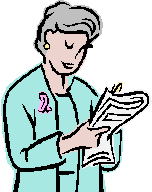 her. She looked friendly, but determined as she walked into the middle of the circle of chairs. “Okay ladies, let’s get started,” she said. The chatter turned to silence as Nancy continued, “Hello everyone! Welcome to this month’s breast cancer support group.” Nancy stretched her arm, opened her hand and pointed it in our direction as she walked to an empty chair near the top of the circle and sat down. “We have a few new faces that I’d like you to meet,” Nancy announced to the group. Immediately, I could feel all the eyes in the room on Michelle and me. I could feel my cheeks blush in anticipation. I knew that Michelle would do most of the talking, but that didn’t stop my palms from sweating the way they always do before I have to speak in front of a group of people. Unsure of where to look, I glanced over at Michelle and saw her olive-toned cheeks were flushed pink like mine. She positioned herself with a wiggle in her chair. She stared intensely forward in Nancy’s direction; her sapphire eyes wide open as she listened. “Michelle, would you like to tell us why you are here today,” Nancy asked. With a crack of her voice Michelle replied, “Sure.” She cleared her throat and suddenly the entire room’s attention was now on my petite friend.
her. She looked friendly, but determined as she walked into the middle of the circle of chairs. “Okay ladies, let’s get started,” she said. The chatter turned to silence as Nancy continued, “Hello everyone! Welcome to this month’s breast cancer support group.” Nancy stretched her arm, opened her hand and pointed it in our direction as she walked to an empty chair near the top of the circle and sat down. “We have a few new faces that I’d like you to meet,” Nancy announced to the group. Immediately, I could feel all the eyes in the room on Michelle and me. I could feel my cheeks blush in anticipation. I knew that Michelle would do most of the talking, but that didn’t stop my palms from sweating the way they always do before I have to speak in front of a group of people. Unsure of where to look, I glanced over at Michelle and saw her olive-toned cheeks were flushed pink like mine. She positioned herself with a wiggle in her chair. She stared intensely forward in Nancy’s direction; her sapphire eyes wide open as she listened. “Michelle, would you like to tell us why you are here today,” Nancy asked. With a crack of her voice Michelle replied, “Sure.” She cleared her throat and suddenly the entire room’s attention was now on my petite friend.
When we first arrived and took our seats among this circle of women, she immediately positioned her feet politely ankles crossed in a pair of glittered sandals with a kitten heel. I’ve often wished I were as lady-like as Michelle. She doesn’t seem to have my inkling for discussing bodily fluids or engaging in shocking dialogue. I often enjoyed telling Michelle off-color stories and jokes knowing that I would get a reaction out of her. Initially, she’d laugh and then turn away as not to indicate that she condoned my vulgarity. Michelle and I could quite possibly be the definition of opposites attract.
 Michelle was born in Santiago, Chile, but moved to the United States as a young girl. She was raised a devout Catholic in an unwavering religion-centric Arizona household. While I was born to parents of German and Swedish decent in the Minnesota and was raised as a fair weather Catholic. Where Michelle relishes and has a very strong faith in God, I often have trouble coming to terms with whether I believe or not. However, on that day among these women, we were both believers.
Michelle was born in Santiago, Chile, but moved to the United States as a young girl. She was raised a devout Catholic in an unwavering religion-centric Arizona household. While I was born to parents of German and Swedish decent in the Minnesota and was raised as a fair weather Catholic. Where Michelle relishes and has a very strong faith in God, I often have trouble coming to terms with whether I believe or not. However, on that day among these women, we were both believers.
Michelle smiled as she briefly took in the faces of each woman in the group. “Hi, I’m Michelle and I’m here today because I was recently diagnosed with breast cancer,” she said. As I listened to her say this short sentence my eyes welled up with tears like it were the first time I learned of her diagnosis. I had yet to accept that my friend had cancer. I sat there wondering why we couldn’t just erase all this cancer business. I longed for the days when I didn’t have to say the word cancer let alone attribute it to one of my closest friends. Instead of spending our Saturday afternoon discussing chemotherapy and radiation, I imagined that we’d return to our former selves. The ones whose biggest concern was where we would go to dinner that night and what we would wear. I desperately wanted it all to disappear, but it didn’t. What I saw that day was the realest thing I had ever seen in my life.
As I studied Michelle’s profile, I wondered why she wasn’t angry. She was a young woman who had been told by her doctor for months that the lump she felt growing in her left breast was a mere cyst and that it would simply “go away.” Her doctor insisted that there was “no way” that her lump could be cancerous because of her young age and the fact that she had no history of it in her family. When Michelle again complained to her doctor that the lump was causing a painful throbbing, her concern was quickly dismissed because according to the doctor, “if it were cancer, it wouldn’t hurt.” Unfortunately, Michelle’s lump didn’t go away, but it did continue to hurt and grow. Months later, Michelle sought the opinion of a second doctor who she insisted do the appropriate tests because in her words, “something wasn’t right.” A few days later the shocking news came via a phone call to her at work. Michelle’s biggest fear had become true; she was part of the less than two percent of women under the age of 30 years old who are diagnosed with breast cancer.
By the time Michelle’s tumor had been diagnosed as cancer it was over five centimeters in size, which is considered a very large tumor by most doctors’ standards. Michelle’s doctors estimated that she had cancer for almost 2 years and didn’t even know it. After more tests, cancer was also found in her lymph nodes. She was then diagnosed with stage 3 breast cancer. At the time of her diagnosis, Michelle and I had only been friends for a year and a half, which meant that she had breast cancer for the entirety of our friendship. This didn’t make sense to me since Michelle never once looked sick. It was hard to comprehend that the same friend that I had just cheered along as she ran her first half-marathon a few months prior was now so ill. In my selfish mind, I felt as though a gift was about to be taken away from me.
Two years ago when I moved across the country and away from all of my family and friends in Minnesota, I was unsure if I’d even make an acquaintance let alone a good friend. I first met Michelle a month after I arrived in Scottsdale, Arizona. We were introduced through mutual acquaintances one cool February evening over drinks. That night I was drawn to Michelle’s sense of humor and smile. It didn’t take long for Michelle and I to become friends. Within a week of meeting we were calling each other on the telephone and making plans to go out. We’re often a compulsive pair and eager to be where the fun is at. At times we’d indulge ourselves in a little too much fun, but I consider that to be part of our charm. After being friends for only a couple of months, I went with Michelle on a  weekend road trip to Rocky Point, Mexico where we shared stories, drinks, laughs and even some tears. Hey, we’re girls, sometimes we drink a little too much tequila and we cry. The waves rushed upon the sand as we sprawled out on the patio chairs and talked about life, love and where we wanted to be in the future. I don’t remember falling asleep that night. I think we just talked until we were both unable to keep our eyes open. Our friendship only grew stronger from there and I felt like I had my first real friend in my new Arizona life.
weekend road trip to Rocky Point, Mexico where we shared stories, drinks, laughs and even some tears. Hey, we’re girls, sometimes we drink a little too much tequila and we cry. The waves rushed upon the sand as we sprawled out on the patio chairs and talked about life, love and where we wanted to be in the future. I don’t remember falling asleep that night. I think we just talked until we were both unable to keep our eyes open. Our friendship only grew stronger from there and I felt like I had my first real friend in my new Arizona life.
Nancy asked Michelle’s age. “I’m 28 years old,” she told the women. Immediately you could hear moans and sighs emitted throughout the room. I watched as tears fell down the face of a woman sitting across from us who later admitted to having a daughter only two years older than Michelle. Soon women from across the circle started shooting questions at her. . Each woman looked visibly upset and wanted answers.
What kind of cancer do you have?
When did you find out?
Are you having chemo?
Are you having your breast removed?
Who is your doctor?
Do you have a plastic surgeon yet?
When’s your surgery?
Where did you find out?
Michelle answered each question with a shocking ease:
I have Invasive Ductal Carcinoma breast cancer
I found out about 1 month ago.
Yes, I will be having chemo.
I am having both breasts removed.
I am seeing Dr. Roberts. She has a plastic surgeon that she trusts who will take care of my reconstruction.
My surgery is scheduled for the end of May.
I was told over the phone while I was at work.
The women seemed m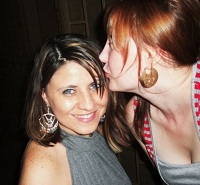 ore and more surprised by each of Michelle’s answers. Despite the chaos that now consumed the room, Michelle remained articulate and even-tempered while continuing to answer the wide array of questions that were thrown at her.
ore and more surprised by each of Michelle’s answers. Despite the chaos that now consumed the room, Michelle remained articulate and even-tempered while continuing to answer the wide array of questions that were thrown at her.
Overnight, Michelle went from a seemingly healthy 28-year-old woman to a breast cancer patient who would soon lose both of her breasts, undergo chemo therapy, radiation and be told that her ovaries may have to be removed. And all of this was expected to be completed before she had the chance to achieve her dream to marry her boyfriend Jake and become a mother.
Michelle lived a very different life before her cancer diagnosis. Her concerns just a few weeks prior were centered on where we would celebrate Jake’s birthday and if we could organize a group of friends together for a summer camping trip. Each week day Michelle and I would exchange numerous emails about topics that usually included relationship issues, stresses at work, weekend plans and our inability to get to our “perfect” weight. At the time, I believed what we discussed was of the utmost importance. I couldn’t seem to see beyond my goal of fitting into my “skinny” jeans. But cancer has a way of giving you the gift of perspective.
“You have been given a gift,” Nancy told Michelle as the surrounding group of women sat silent. “You will now have a whole new outlook on life. It may even be hard for you to relate to friends your age because you’ve seen the big picture.” A woman sitting next to me nodded her head profusely in agreement with Nancy’s words. “That’s what happens when someone as young as you goes through something like cancer. It’s a mixed blessing because it teaches you how to live in the moment, by threatening the end.” Nancy paused. “And not many people can live in the moment.” I knew Nancy’s words to be true because I could already see that Michelle’s diagnosis provided her with a greater understanding that I lacked.
Being a woman in my twenties, breast cancer seemed to be that thing that I wouldn’t worry about until I was older. However, Michelle was proof that just because you’re young that doesn’t mean you’re immune. Michelle never thought that she’d be facing cancer at any age, let alone in her twenties. And it never crossed my mind that anyone my age with no prior history could have breast cancer. I’ve seen the pink ribbons, the signs promoting self examinations and I’ve even participated in a Walk for the Cure, but I always thought that I was helping other people, older people, but never one of my friends.
After Michelle shared her story and answered a myriad of questions, it was time for a roundtable discussion between all of the women. For the next two hours, I listened to stories full of struggle, pain, family, perseverance and change. It’s amazing to listen as women who must continually fight off death become emotional when discussing not what their own illness has done to their lives, but what it has done to their children, husbands, parents, families, and friends. I expected to hear somebody ask, “Why me?” Or yell out, “It’s so unfair,” but I never did.
Instead, I heard Frances discuss how after her recent double mastectomy, she had to learn to empty and measure the orange fluid that drained through two tubes coming out of both sides of her chest.
I listened as Anne talked about the damage her new cancer treatment could do to her current heart condition. “It could either save me or kill me,” she said with eerie certainty and compliance.
And then there was Beverly. Beverly sat proudly in a bright magenta t-shirt, big pearls around her neck, and stark white slacks. She had a volume-induced, perfectly coiffed hairstyle straight out of Steel Magnolias. She was a native of Kentucky and you could hear every bit of it in her accent as she spoke. “I went to the American Cancer Society office and they gave me two free wigs,” Beverly announced to the group. “My old wig was just awful. It was all ratty in the front like a bird’s nest. I don’t understand why someone didn’t tell me just how bad it looked. I suppose my friends must’ve enjoyed watching me go ’round for a year looking a fool with that thing on my head.” The entire room was full of laughter as Beverly provided her colorful anecdotes in a candid Southern twang. “I mean, I have to wear this wig because my neighbors don’t know I got cancer. And I don’t want ’em to neither. I only walk bald around the house, but I need a good-lookin’ wig for when I go out to get mail or do yard work.” Beverly patted the top of her wig and then reached down to straighten the bottom of her pant leg. “Many times I forget I’m bald and I’ll just walk right over without my wig on and answer the door. After scaring a few too many delivery men, I’ve put up a mirror next to the front door so I can see myself before I open it.” Beverly smiled and again lightly patted the top of her wig as if to make sure it was still on her head. “And I’m not a good-lookin’ bald lady neither. But my hair has started to grow back since I finished chemo. Unfortunately it’s completely gray and hasn’t grown more than an inch in 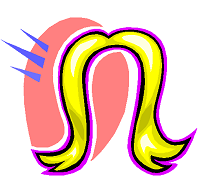 months. I can’t let anyone see that!” The women looked amongst each other and laughed. “So when I heard they were giving away free wigs, I went right over. The girl there told me that my wig needed help,” Beverly rolled her eyes. “I told her, ‘honey that’s why I’m here.’ When I got the wig it seemed fine, but then it turned into a mess. I took care of it the best I knew how. I washed it in the shower every week and then shook it out and hung it up to dry, but the top just kept getting frizzier and frizzier,” she complained.
months. I can’t let anyone see that!” The women looked amongst each other and laughed. “So when I heard they were giving away free wigs, I went right over. The girl there told me that my wig needed help,” Beverly rolled her eyes. “I told her, ‘honey that’s why I’m here.’ When I got the wig it seemed fine, but then it turned into a mess. I took care of it the best I knew how. I washed it in the shower every week and then shook it out and hung it up to dry, but the top just kept getting frizzier and frizzier,” she complained.
Nancy interrupted Beverly and asked, “Did you open the stove while wearing it?” Beverly smiled, “Yes! And that’s what the gal at the American Cancer Society asked me too. I was shocked. You can’t open a stove with that kind of wig on yer head cuz it causes it to frizz up on the ends. But no one told me that when I got the damn thing.” A howl of laughter ignited the room. A woman sitting next to Beverly with a floral scarf on her bald head reached out and placed her hand over Beverly’s hand while it was resting on her knee. They both turned and smiled at each other as they kept their hands clasped together.
Three o’clock seemed to come sooner than most women would have wanted. Nancy worked to get the women’s attention because by that point, they were all in their own conversations with one another. “Okay ladies, our time’s almost up. I’m going to close the door and then we’ll do a little show and tell before we head out.” Michelle and I looked at each other puzzled by what exactly we were expected to show or tell. But we were given little time to contemplate what was to happen next. As soon as the door was closed, off came almost every woman in the group’s shirt. Some women opted to simply pull down their tank tops or bras, but the basic theme was the same, there were breasts all around us.
Each reconstructed bare chest was displayed proudly for the entire room to see. The breast sizes varied. Some women chose to go up a cup size from what they were pre-cancer; some chose to stay the same and others opted for smaller breasts than they originally had. As I looked upon the breasts of women whom I had only met three hours earlier, I felt as if I was intruding. I felt like I should look away so I looked to the ground and then to my nails and then to the scarcely decorated walls. Michelle and I looked at each other for a moment and giggled nervously like school girls during sex education class. We both did our best to look at anything but their naked breasts. However, as we tried to divert our attention, we were immediately invited back in by one of the exposed women.
“Do you want to see,” Rose, a 42-year-old breast cancer survivor, asked while peering over her bare shoulder. “Yes,” Michelle answered back in what sounded like a whisper as we walked over to Rose. Rose’s breasts were beautiful. They were perfectly round and perky. The only signs of her surgery were a few scars. “I went up a size,” Rose said as she happily cupped both of her hands underneath her breasts. Soon Michelle and I were taken on what we later referred to as a Tour of Boobs. Rose took us both by the hands and introduced us to the breasts of each woman. “Look at Kate’s boobs,” Rose pointed out. “She decided not to have nipples tattooed on.” Kate stood tall and smiled as she positioned her breasts about four inches from my face. “Without nipples, I can wear a t-shirt and no bra. It’s great,” Kate explained. “I mean, it’s not like I’ll be breastfeeding anymore,” Kate said as the women standing around her laughed.
Each woman lifted/removed their shirts without shame. Michelle and I anxiously kept on with our tour. We briefly and politely inspected each breast making sure not to glance too long. As our tour ended, we watched as the women examined each other’s breasts and made comparisons.
“I think he made yours bigger than mine, but he did a great job on both,” Nancy told a dark-haired woman who was only a few weeks post reconstructive surgery. “He’s a genius,” the woman responded. “He’s truly the best,” Rose added as she pulled her shirt down now covering her breasts. I wondered who he was when Michelle turned to Nancy and asked, “Who are you talking about?” Nancy turned to Michelle and smiled, “Dr. Gully. He reconstructed the breasts of most women in this room.” We were still standing in the circle as one by one each woman put their bras, shirts and tank tops back on. Nancy proudly stepped to the middle of the circle, opened her arms in front of the entire group of women and proclaimed, “We’re the Gully Girls!”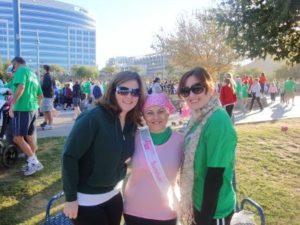
October is National Breast Cancer Awareness Month. This story is dedicated to the memory of the beautiful Michelle Wilsey-Berry who passed away in January 2012. Rest in peace, my friend.
Team Michelle forever!
Say It. Fight it. Cure it.

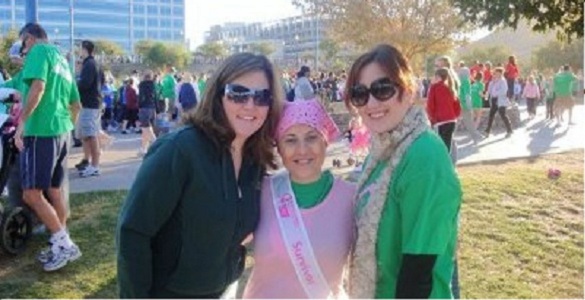



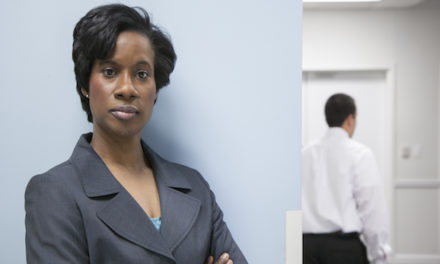
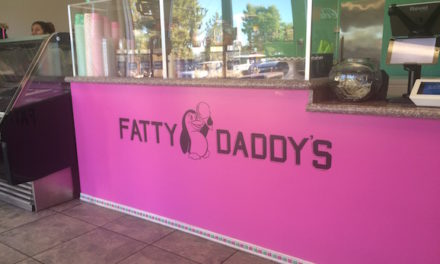











I have not checked in here for a while since I thought it was getting boring, but the last few posts are great quality so I guess I will add you back to my daily bloglist. You deserve it my friend 🙂
Good day! Would you mind if I share your blog with my facebook group? There’s a lot of people that I think would really enjoy your content. Please let me know. Thank you